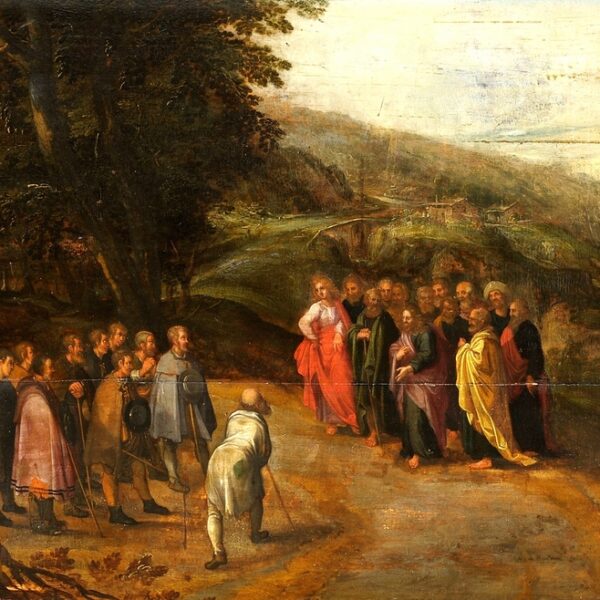The Spirit of Truth will guide you: avoiding the ditch on either side of the narrow way

Trust the experts? “Nobody loves you that much except Jesus!”
November 11, 2021
The church is groaning with creation
December 1, 2021“If what you thought to be true was not, would you want to know?”
A friend posted this question on social media and the responses were surprising. Instead of the universal “of course!” which I anticipated, several individuals replied “it depends” or “not necessarily.” Openly, several people admitted before their peers that, given a choice, they would rather believe some lies than have to change their minds.
“The truth shall set you free,” Christ said; yet how many would rather live in bondage than bear the personal responsibility that freedom brings?
This is a time of exposure, of paradigm shifts, of repentance, and of changing one’s mind. Yet a potential pitfall is that in swerving to avoid a trap, we don’t careen into a ditch on the other side.
Two specific concerns for the body of Christ in this time of shaking are that,
-
We would not be divided by non-foundational issues, but would commit to give each other grace where there’s difference of opinion
-
In our rejection of the prevalent lies we realize have propped up much of the culture, we would not embrace new lies simply because they’re novel and non-mainstream
Here are some examples of what I mean:
Distrust of the medical system and governmental agencies has led an increasing number to embrace natural health and alternative medicine. In the church community, I’m observing a polarization between these two camps and a line drawn that in essence asks people to choose a side. This is a mistake.
Misinformation that’s been presented as “science” and incorporated into education curriculum for decades is being challenged and debunked by other scientists and historians, both Christian and secular. However, there is some equally sensationalized material circulating via the world wide web that seems to be enticing those who’ve just been delivered out of the camp of mainstream falsification. Some of these fantastical “theories” are deliberately being propagated to discredit and to distract the church, I believe.
Operating in freedom with forbearance
God’s people are commanded to love the truth and to compel others to good works. In our zeal, however, we must take care, where the Bible is neutral or does not delineate a core issue, not to make doctrines out of food, health, and personal convictions.
Likewise, human nature feels secure hanging out in one camp on issues. To be unsure of what we think, or to venture out to explore other ideas, makes us feel vulnerable. In reality, we may be experiencing the pain of growth – and the “wilderness” in between moving may be quite healthy. Discomfort is not something we humans are drawn to nor manage well; but that is not an indicator that what we are going through is not good for us.
Scripture gives us parameters in navigating personal convictions and that of other Christians. Here are just a few (all translations except the first are KJV, which I hope is not another point of contention for some!):
“Examine all things; hold fast to that which is good” (1 Thessalonians 5:21, ESV)
“Who are you to judge someone else’s servant? To his own master he stands or falls. And he will stand, for the Lord is able to make him stand. One person regards a certain day above the others, while someone else considers every day alike. Each one should be fully convinced in his own mind. He who observes a special day does so to the Lord; he who eats does so to the Lord, for he gives thanks to God; and he who abstains does so to the Lord and gives thanks to God” (Romans 14:4-6).
“I know, and am persuaded by the Lord Jesus, that there is nothing unclean of itself: but to him that esteemeth any thing to be unclean, to him it is unclean” (Romans 14:14).
“Let no man therefore judge you in meat, or in drink, or in respect of an holyday, or of the new moon, or of the sabbath days” (Colossians 2:16).
“Some with conscience of the idol unto this hour eat it as a thing offered unto an idol; and their conscience being weak is defiled” (1 Corinthians 8:7)
“And hereby we know that we are of the truth, and shall assure our hearts before him” (1 John 3:19-21)
“You, however, have an anointing from the Holy One, and all of you know the truth. I have not written to you because you lack knowledge of the truth, but because you have it, and because no lie comes from the truth” (1 John 2:20-21).
More wisdom is available
Scripture is clear that the choices we make must be done in faith. As we move about in our freedom in Christ, let us not look down on nor be intimidated by other believers who think differently.
To the second point, may we have the courage to realize that good people with real wisdom who have knowledge of great value sometimes are operating in systems that have been skewed by political power and by money. Tossing out the baby with the bathwater will leave us deprived and susceptible. These days, we must ask the Lord’s wisdom for things that perhaps formerly we took for granted.
Thankfully, He promises to give wisdom freely to the one who asks (James 1:5). He assures us that the Spirit of Truth will guide us in all truth (John 16:13). Praise be to God!






6 Comments
Your last article was very well written and a good message to be heard.I hope people apply it.
Thanks, Rudy! Appreciate you reading – blessings.
Very good points, Emily. I see this going on a lot — people wanting to hang onto lies even after they are clearly disproven. Thank God for the Spirit of Truth, Who will guide us into all truth — if we are willing to listen. (John 16:13).
Thanks, Lee Ann. Yes, even if a philosophy can be punched full of holes there’s this refusal to let go. One wonders if there was always such obstinance or if it’s this generation.
It was said a long time ago that it is much easier to fool a person than to convince a person they have been fooled , human dignity , also known as pride, simply will not allow a person to admit they have been deceived, tricked or fooled, they would rather give further substance to the lie in order to preserve their dignity, but we know God is the author of all truth as well as who is the author of lies
So very true, Gordon. A humble man is a truly rare and remarkable person.